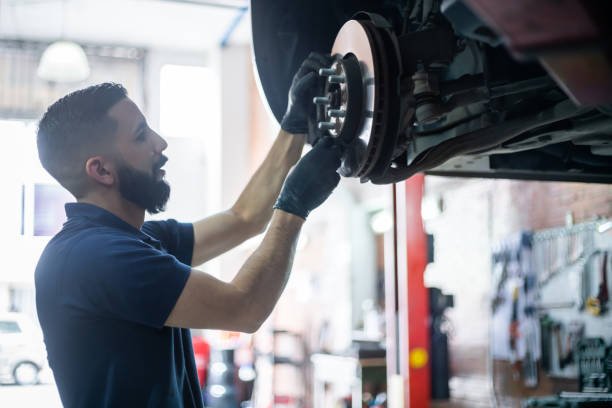Brakes Repair: Keeping Your Car Secure and Responsive
Your car’s braking system is one of the most basic security highlights. Whether you’re cruising on the thruway or exploring nearby lanes, legitimately working brakes guarantee control and avoid mishaps. Opportune brake repair in Memphis TN isn’t just a fair upkeep routine—it’s a life-saving necessity.
Signs Your Brakes Require Repair
Brake repair once in a while come without warning. Observe for these common signs:
- Squealing or pounding noises
- Increased halting distance
- Soft or light brake pedal
- Steering wheel vibration amid braking
- Brake caution light on your dashboard
Ignoring these signals can lead to serious harm and higher repair costs.
Common Brake Problems
Several components can wear out or glitch. Here are a few commonplace brake repair:
- Worn brake pads
- Warped or harmed rotors
- Brake fluid leaks.
- Stuck calipers
- Air in the brake lines
What Happens Amid a Brake Repair Service?
A standard brake repair service regularly includes:
- Removing the wheels
- Inspecting brake cushions and rotors
- Replacing worn cushions or machining/replacing rotors
- Checking brake fluid levels and quality
- Inspecting brake lines and calipers
- Road testing after completion
Professional mechanics take these steps to guarantee your brake system is completely useful and safe.
DIY Brake Repairs: A Great Idea?
While a few experienced car proprietors handle minor support themselves, most brake repairs are best cleared out to certified specialists. Botches in this range might lead to brake disappointment. Unless you have legitimate apparatuses, preparation, and certainty, it’s shrewd to believe the pros.
Choosing a Dependable Brake Repair Shop
When selecting a brake repair shop, consider:
- ASE-certified technicians
- Warranty on parts and labor
- Transparent pricing
- Good surveys and recommendations
A legitimate technician will clarify the issue clearly, show you worn parts, and grant a point-by-point gauge some time recently beginning work.
Preventive Tips for Brake Longevity
Here are a few propensities to offer assistance and amplify the life of your brakes:
- Avoid forceful driving or difficult braking.
- Coast to moderate down at whatever point possible.
- Remove overabundant weight from your vehicle.
- Regularly assess and top off brake fluid.
- Get scheduled brake inspections.
- With care and consideration, your brakes can last longer and perform more reliably.
(FAQs)
Q1: How long do brake cushions regularly last?
Most brake cushions last between 25,000 and 65,000 miles, depending on driving fashion and conditions.
Q2: Is it secure to drive with squeaky brakes?
Squeaky brakes can demonstrate worn cushions or coated rotors. Whereas not continuously unsafe, it’s a sign that your brakes require inspection.
Q3: Can I supplant brake cushions without supplanting rotors?
Yes, but as it were, if the rotors are in great shape. If they’re worn, distorted, or furrowed, substitution is suggested for ideal performance.
Q4: How do I know if my brake rotors are bad?
Side effects incorporate vibration when braking, grooves on the rotor surface, or a burning scent after difficult stops.
Q5: What ought I to do if my brake caution light comes on?
Halt driving and check your brake fluid level. If the light remains on, look for a proficient offer of assistance immediately.
Conclusion
Brake repair is more than a fair service—it’s a security need. Recognizing caution signs early and keeping up your braking system guarantees peace of intellect for you and your travelers. Don’t cut corners when it comes to brakes; your life seems to depend on it.


